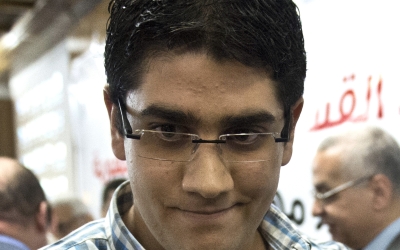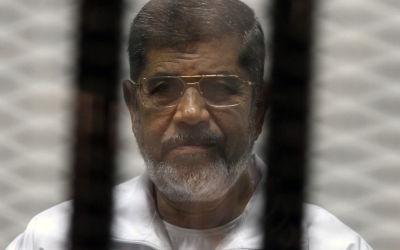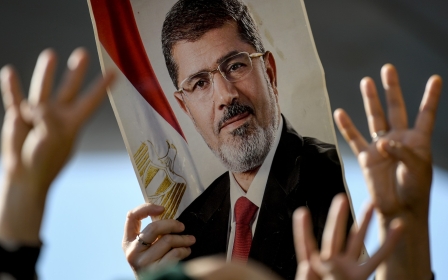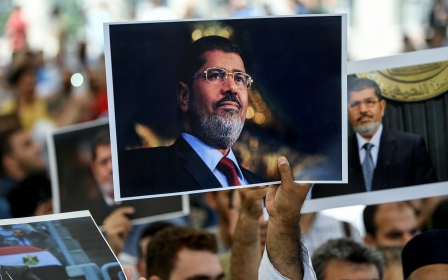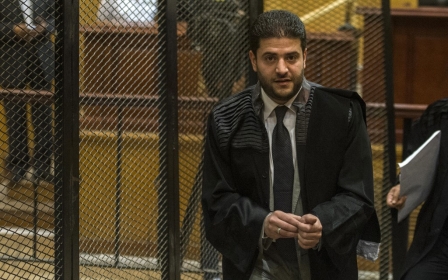Son of Egypt's former President Morsi 'killed with lethal substance': Lawyers
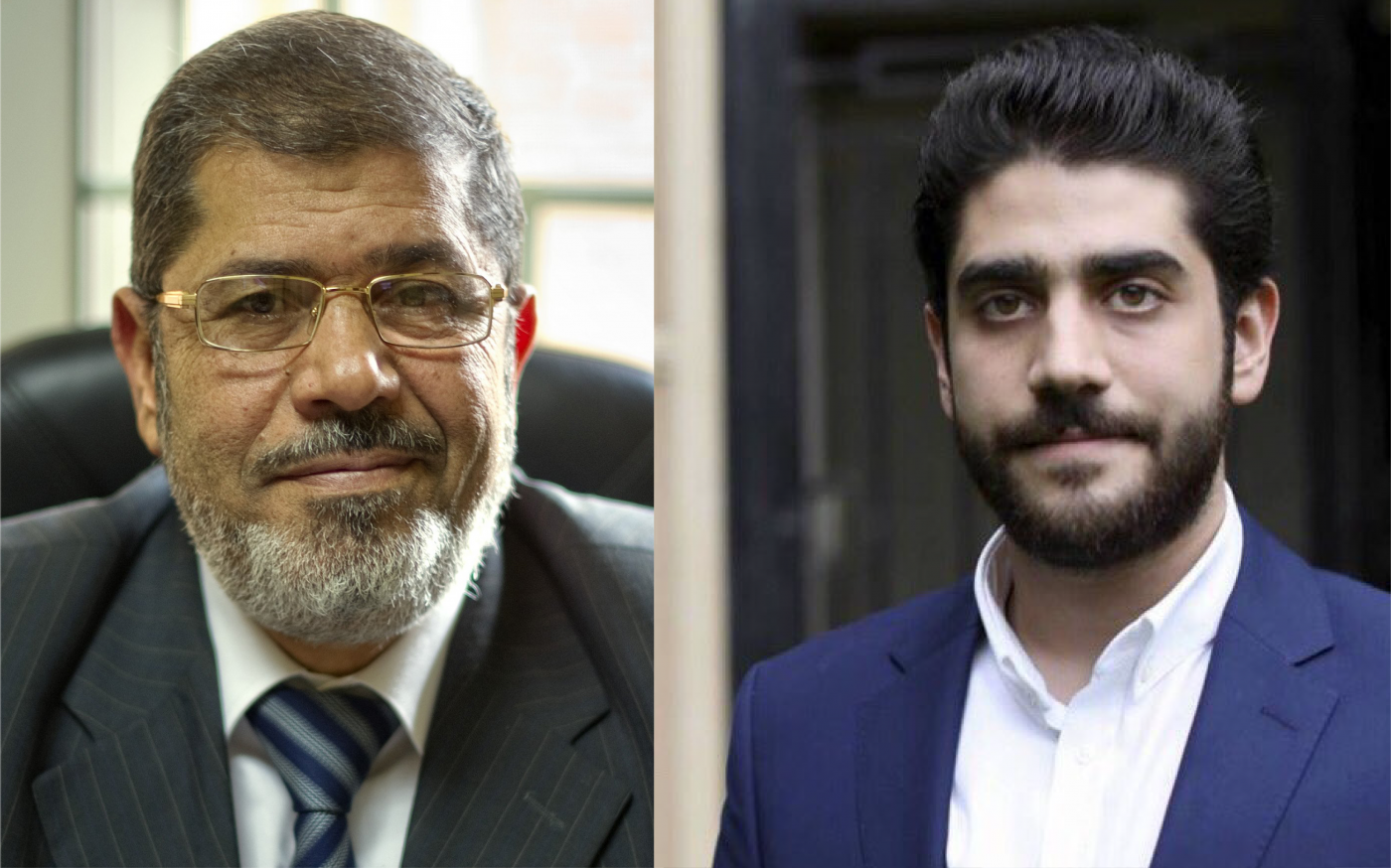
A British team acting as legal counsel to the family of Egypt’s former President Mohamed Morsi said it had received credible information that his youngest son had been killed a year ago by “a lethal substance”.
On 4 September 2019, Abdullah Morsi was found dead at the age of 25 in a hospital in Giza, south of the Egyptian capital, allegedly after suffering a heart attack.
'The information we have leads us to believe that he was killed'
-Toby Cadman, British lawyer
At the time, his lawyer in Cairo, Abdelmonem Abdelmaksoud, said Abdullah had had a heart attack while driving in his car with a friend. The friend was reportedly able to stop the car and drove to the al-Waha hospital, but doctors' efforts to resuscitate him had been unsuccessful, he said.
The Egyptian government at the time confirmed the report.
However, on the first anniversary of his death on Sunday, Morsi’s legal team at Guernica 37 International Justice Chambers announced that they had obtained information that cast new light into the cause of his death.
New MEE newsletter: Jerusalem Dispatch
Sign up to get the latest insights and analysis on Israel-Palestine, alongside Turkey Unpacked and other MEE newsletters
“Information now disclosed appears to confirm that Abdullah was transported in his car a distance of more than 20km to a hospital after he took his last breath as a result of having been injected with a lethal substance, and he was not transferred to nearby hospitals, intentionally, until after he had died,” a statement by the London-based law firm read.
“It is quite clear that certain elements of the state were aware of this fact that is only now coming to light,” it added.
'Mysterious' death
Toby Cadman, who heads the Guernica 37 legal team, told Middle East Eye on Monday that the circumstances surrounding the death remained “mysterious”.
“There are a number of questions that remain unanswered, but the information we have leads us to believe that he was killed,” he said.
Prior to his death, Abdullah, Cadman said, had lived in fear for his life after publicly accusing certain government officials of killing his father, the late president who had died in a courtroom in June 2019.
Days after his father had died, Abdullah identified several figures, including current Interior Minister Mahmoud Tawfiq, his predecessor Majdi Abdel Ghaffar, and Mohamed Shereen Fahmy, the judge who oversaw the ex-president's trial, as "accomplices" in the "assassination of the martyr, President Morsi".
Morsi had been elected in Egypt's first-ever democratic presidential election in 2012, after a popular uprising had overthrown longtime leader Hosni Mubarak.
A year into his rule, Morsi had been overthrown by the Egyptian military in a coup led by his own defence minister, Abdel Fattah el-Sisi, who would go on to become president.
Since then, Sisi has embarked on a massive campaign to crack down on dissent and free speech. He has also banned the Muslim Brotherhood, of which Morsi had been a senior member, blacklisting it as a terrorist group.
“I have spoken to Abdullah prior to his death, and he was obviously very afraid for his own safety,” Cadman told MEE.
Unlike government reports that he had died of a heart attack in hospital, Cadman’s legal team concluded that he was killed outside his home on 4 September 2019.
The team said that the Egyptian Public Prosecution had already brought charges of premeditated murder against a 36-year-old woman called Randa Ali Shaker Ali Asran, an Egyptian national residing in Bab el-Shaaria in Cairo.
Secret trial
Asran had been prosecuted in a secret trial, according to Morsi’s lawyers, and the result of the forensic report of his death had been kept secret.
The lawyers said that Asran had not faced a transparent investigation. Moreover, she was not alone at the time of Abdullah’s death, but rather had been in the company of a man known as “Micho”. This was contrary to initial reports by the government that Asran was the only one present when Abdullah Morsi had died.
The person called Micho had communicated to the legal team that Abdullah died after being injected with a deadly substance by Asran, after which he had been transported in his car to the Giza hospital. A video leaked to the legal team appeared to show a deceased Abdullah being carried by Asran and Micho into the hospital.
“It is regrettable that the prosecution did not summon or search for the accused [Micho], who handed the car key to the hospital receptionist and then disappeared, and who drove the car and escorted the accused to the hospital before disappearing,” the lawyers said.
“In this video, Abdullah's car can clearly be seen, and Abdullah appears on a stretcher. The defendant Asran also appears, along with the unknown person known as Micho.”
It wasn't immediately clear if Asran or Micho were currently in custody.
While the lawyers accused “certain elements of the state” of being aware of the fact that Abdullah had been intentionally killed, they also said that the security service was “not satisfied” with what happened to him.
“He was the son of a former Egyptian president who is supposed to be subject to the highest level of protection of the Republican Guard, as with the children of all former heads of state,” it said.
“Rather than affording the highest level of protection under the law, the family is continually subjected to danger, to threats and to interference in their private lives."
The lawyers called for an independent investigation into the alleged murder. They also called for the immediate and unconditional release of Osama Morsi, another son of the former president, who had been held in detention for almost four years.
Middle East Eye delivers independent and unrivalled coverage and analysis of the Middle East, North Africa and beyond. To learn more about republishing this content and the associated fees, please fill out this form. More about MEE can be found here.


